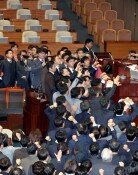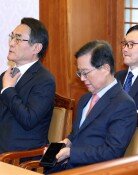Kim Jong Un’s tactic to increase his leverage
Kim Jong Un’s tactic to increase his leverage
Posted November. 25, 2024 07:45,
Updated November. 25, 2024 07:45
“We have already taken negotiations with the U.S. as far as they can go,” stated North Korean leader Kim Jong Un. “What we confirmed from the results was not the great power’s (the U.S.) willingness for coexistence but its thoroughly force-driven, invasive, and hostile policy toward North Korea,” he added. Citing the lack of success in negotiations between the United States and North Korea during Donald Trump’s first presidency, he warned that Trump’s second term would bring a ‘strength-to-strength confrontation’ involving nuclear capabilities. However, some interpret Kim’s remarks as a hint at the possibility of a 'reunion,' as he explicitly recalled his willingness to negotiate and coexist with Trump.
Ahead of the U.S. presidential election, North Korea escalated tensions through a series of provocations. In September, it unveiled a key facility for producing highly enriched uranium (HEU). In October, it installed an anti-tank barrier at the Demilitarized Zone (DMZ) to further isolate itself from the South. Just five days before the election, it launched a new intercontinental ballistic missile (ICBM). The recent deployment of North Korean troops to Russia is not only related to Russia’s transfer of nuclear technology but also appears to be an attempt to strike a significant deal with the United States in the shifting security environment of the Trump era.
It’s a classic North Korean tactic to increase its leverage. For more than three decades, North Korea has routinely provoked the United States with nuclear and missile tests around the U.S. presidential election. For instance, it announced its withdrawal from the Nuclear Non-Proliferation Treaty (NPT) five months after Bill Clinton won the 1992 presidential election. When Trump was first elected, Pyongyang escalated tensions with a sixth nuclear test and an ICBM provocation in 2017. However, this stance shifted with the U.S.-North Korea summits in 2018 and 2019.
Given this precedent, Kim Jong Un may have implied that he is open to dialogue if Trump, unlike Joe Biden, reverses his hostile policy toward North Korea. On the campaign trail, Trump repeatedly emphasized, “I got along well with Kim Jong Un” and “It’s good to get along with someone who has nuclear weapons.” Notably, Trump also nominated Alex Wong, who played a key role in the U.S.-North Korea summit, to serve as the principal deputy national security advisor in the White House.
If a direct deal is struck between the United States and North Korea, Kim will likely seek the lifting of sanctions in exchange for recognition as a de facto nuclear power and steps toward nuclear disarmament. It is also possible that President-elect Trump, who prioritizes tangible outcomes, will respond favorably. In such a scenario, we cannot rule out the possibility of the South Korean government being sidelined in U.S.-North Korea relations, thereby increasing security risks. The South Korean government should focus its diplomatic efforts on preventing ‘Korea passing’ and ensuring that the South Korea-U.S. alliance remains strong.







